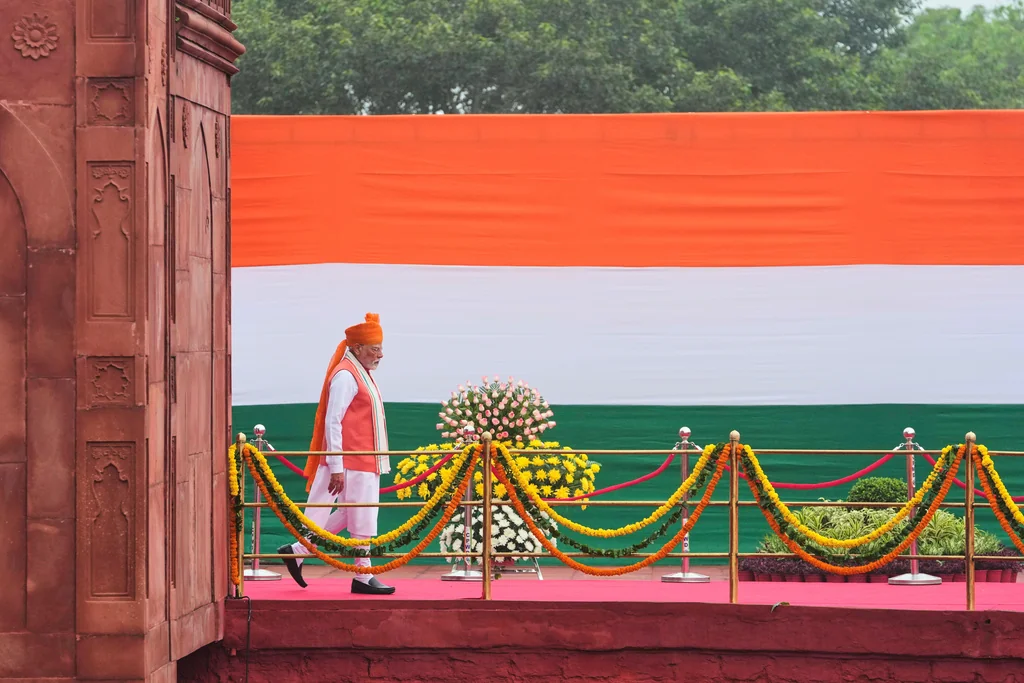Indian Prime Minister Narendra Modi cautioned Pakistan against future nuclear conflict between the two countries on India’s Independence Day Friday.
Friday marks 78 years since India declared its independence from British colonial rule.
India’s leader addressed the country from the 17th-century Red Fort, saying that India has established a “new normal” that does not draw differences between terrorists and terrorism sympathizers.
He also said he would not tolerate Pakistan’s “nuclear blackmail.” Pakistan is one of 9 countries, also including India, with access to nuclear weapons.
“India has decided that it will not tolerate nuclear threats. For a long time, nuclear blackmail had been going on but this blackmail will not be tolerated now,” Modi said.
Pakistani Prime Minister Shehbaz Sharif on Thursday announced a new “Army Rocket Force Command” to boost his country’s defense ability. Modi’s comments are also potentially a response to the Pakistani army’s chief of staff, Field Marshal Asim Munir, who threatened India with nuclear retaliation if Pakistan came under threat.
“We are a nuclear nation; if we think we are going down, we’ll take half the world down with us,” he said, according to Indian press, at a gathering of the Pakistani community in Tampa, Florida.
He also reportedly acknowledged that a “bilateral conflict due to any mistake by India would be a huge blunder.”

The back-and-forth illustrates the status of nations’ shaky ceasefire. Pakistan and India have warred for decades with the most recent iteration back in May. The two nations battled for four days with missile and drone strikes until a U.S. peace effort helped the nations come to a ceasefire.
The conflict was sparked by a massacre in Indian-controlled Kashmir by a gunman who killed 26 people. Pakistan denied responsibility before India launched strikes on “terrorist infrastructure” in their rival country.
“Terror infrastructure was turned to rubble,” Modi said in his speech on Friday.
Modi also hinted during his speech that India would continue its unilateral suspension of the Indus Water Treaty, which grants water-sharing of the Indus River.
“Rivers from India were irrigating the lands of enemies while my country’s farmers and land faced a deficiency of water,” Modi said. “India has now decided that blood and water will not flow together.”
Pakistan said any effort to divert water away from them would be considered an “act of war.”
Modi did not mention Trump’s tariffs on India in his speech. The president recently enforced a 25% levy on India and 25% additional tariff for buying oil from Russia. The Indian Prime Minister has resisted efforts to open the country’s markets for risk of angering farmers, a major voting bloc.
“India will not compromise on the interest of farmers,” he said.
Modi vowed to build a “self-reliant India” that will, among other things, produce its own semiconductor chips.
TRUMP SECONDARY TARIFFS ON INDIA COULD HAVE RIPPLE EFFECT ON GLOBAL OIL SUPPLY
“I want to tell our citizens, our youth, and everyone who understands the power of technology, that by the end of this year, ‘Made in India’ semiconductor chips will be available in the market,” he said.
It’s unclear where the India-U.S. trade talks are headed. Indian commerce secretary Sunil Barthwal told reporters Thursday that India remained “fully engaged with the US in trade negotiations.”
















